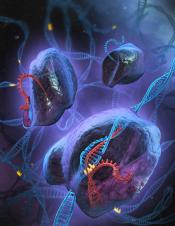1st Patients To Get CRISPR Gene-Editing Treatment Continue To Thrive
By Rob Stein,
NPR
| 12. 15. 2020
The last thing a lot of people want to do these days is get on a plane. But even a pandemic would not stop Victoria Gray. She jumped at the chance to head to the airport this summer.
"It was one of those things I was waiting to get a chance to do," says Gray.
She had never flown before because she was born with sickle cell disease. She feared the altitude change might trigger one of the worst complications of the devastating genetic disease — a sudden attack of excruciating pain.
But Gray is the first person in the United States to be successfully treated for a genetic disorder with the help of CRISPR, a revolutionary gene-editing technique that makes it much easier to make very precise changes in DNA.
About a year after getting the treatment, it was working so well that Gray felt comfortable flying for the first time. She went to Washington, D.C., to visit her husband, who has been away for months on deployment with the National Guard.
"It was exciting. I...
Related Articles
By Scott Solomon, The MIT Press Reader | 02.12.2026
Chris Mason is a man in a hurry.
“Sometimes walking from the subway to the lab takes too long, so I’ll start running,” he told me over breakfast at a bistro near his home in Brooklyn on a crisp...
By Diaa Hadid and Shweta Desai, NPR | 01.29.2026
MUMBRA, India — The afternoon sun shines on the woman in a commuter-town café, highlighting her almond-shaped eyes and pale skin, a look often sought after by couples who need an egg to have a baby.
"I have good eggs,"...
By George Janes, BioNews | 01.12.2026
A heart attack patient has become the first person to be treated in a clinical trial of an experimental gene therapy, which aims to strengthen blood vessels after coronary bypass surgery.
Coronary artery bypass surgery is performed to treat...
By Staff, ScienceDaily | 01.05.2026
Scientists at UNSW Sydney have developed a new form of CRISPR technology that could make gene therapy safer while also resolving a decades-long debate about how genes are switched off. The research shows that small chemical markers attached to DNA
...




